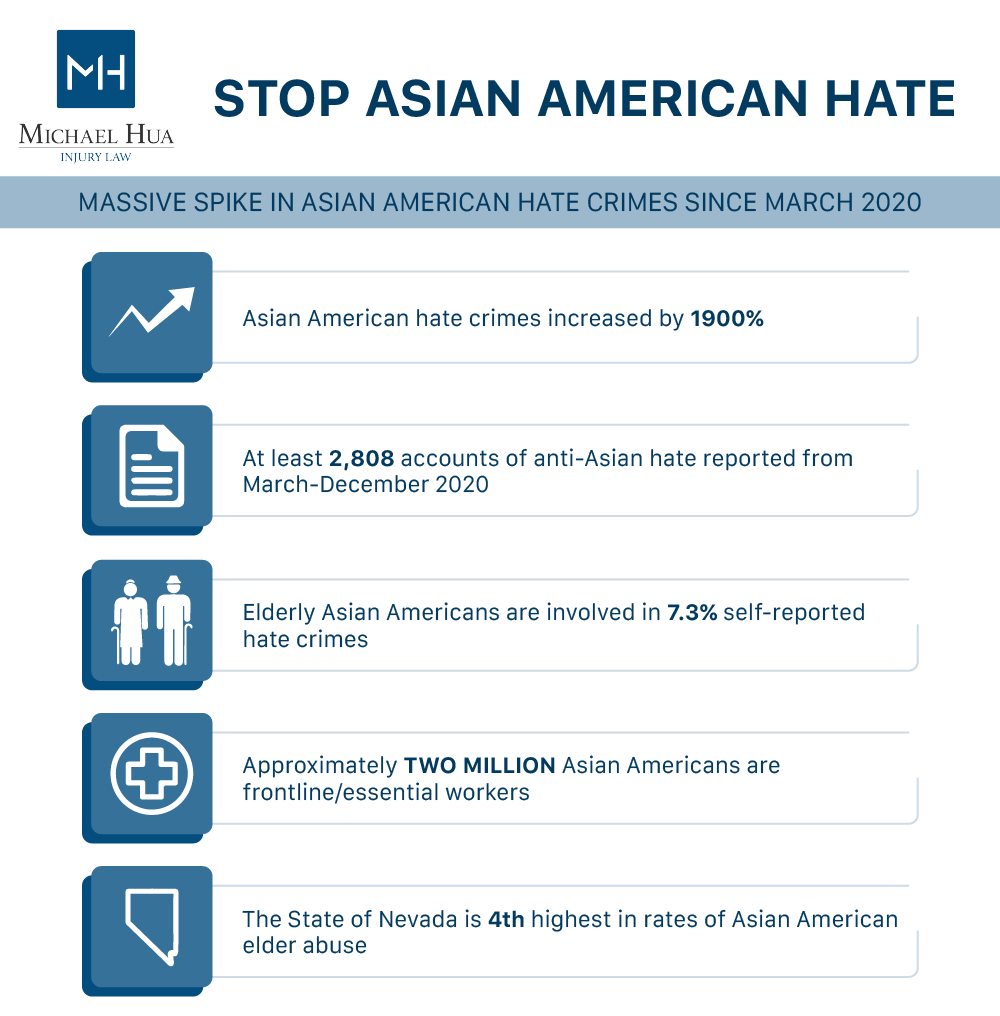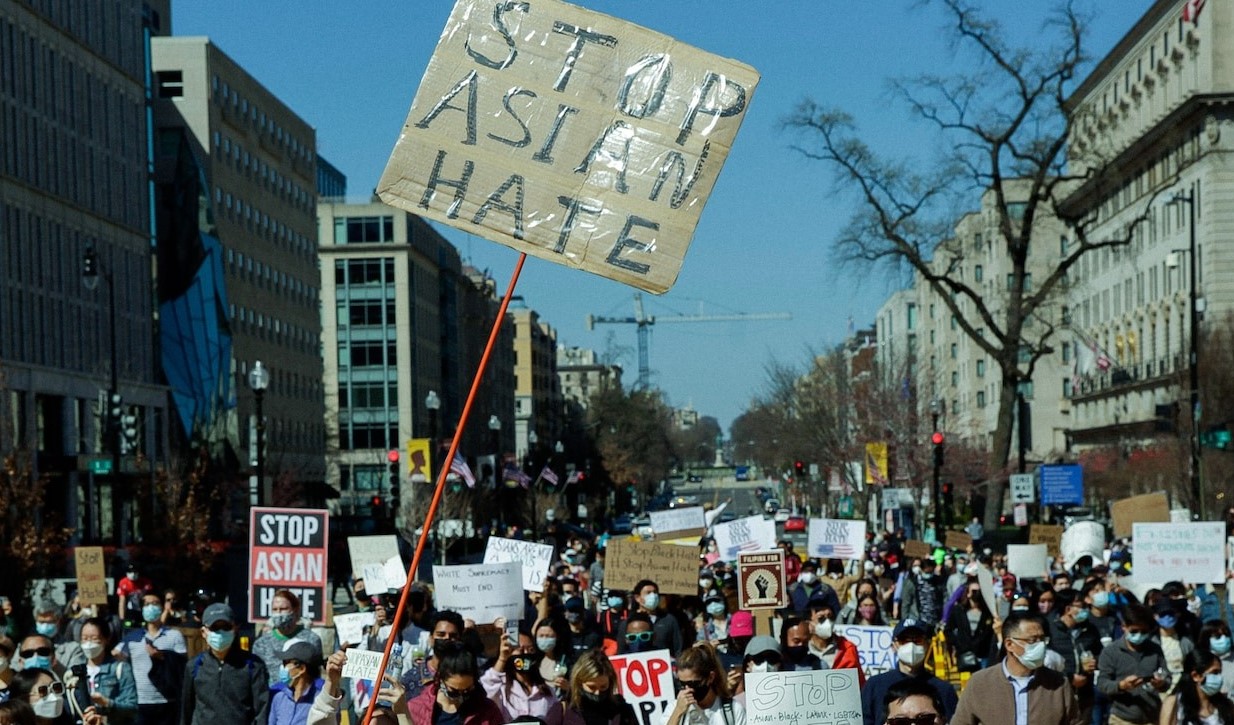STOP ASIAN AMERICAN HATE
An 84 year old immigrant from Thailand was shoved to the ground and senselessly murdered.
A 91 year old Chinese man was needlessly pushed to the ground.
A 61 year old Filipino man was slashed in the face with a cutter and no one helped.
“f—–king Chinese coronavirus,”
“Where’s your f—ing mask, you Chinese b—-h,”
“Go back to China!”
“Infected China boy”
Kicking, punching, harassment, threats, spitting cursing, choking, racial slurs, pouring corrosive acid, beating…
The first step in solving any problem is recognizing there is one.
Racial Violence against Asian Americans: Fast Facts and Statistics
Hate Crime Laws Definition: A hate crime include crimes committed based on the victim’s perceived or actual race, color, religion, national origin, sexual orientation, gender, gender identity, or disability.
Asian immigration to the United States has increased significantly since the enactment of the Immigration and Naturalization Act in 1965.
Census Bureau statistics show that the Asian population increased from 3.5 million in 1980 to 11.9 million in 2000, and further increased to 19.4 million in 2013, accounting for 5.6% of the U.S. population.
Per the National Crime Victimization Survey (NCVS), the rate of violent crime committed against Asians increased from 8.2 to 16.2 per 1000 persons age 12 or older from 2015 to 2018.
According to a report released by The Asian Pacific Policy and Planning Council and Chinese for Affirmative Action recently, “more than 2,100 anti-Asian American hate incidents related to COVID-19 were reported across the country over a three-month time span between March and June.”
An estimated 2 million Asian Americans and Pacific Islanders have served on the front lines of the COVID crisis as healthcare providers, as first responders, and in other essential roles.
One in four Asian American youths have experienced racist bullying.

Startling Spike in Asian American Hate Crimes in the United States
The Asian American population in the United States has always been significantly trending upwards. Though still considered a comparatively small minority group compared to other ethnicities, Asian Americans are among one of the fastest-growing racial groups within the United States.
According to New York Police Department (NYPD) data, a steady decrease of Anti-Asian American hate crimes have been observed throughout the last three years… until the Coronavirus disease 2019 (COVID-19) pandemic occurred (ever heard of it?).
Former President Donald Trump has been criticized by the Asian American community.
Co-Executive Director of Chinese For Affirmative Action Cynthia Choi gave a bold statement that the Asian-American community is “certainly being targeted and being blamed for COVID, and certainly anti-China, anti-Chinese, and anti-immigrant climate under the former president didn’t help the situation.”
Indeed, former attitudes contributed to the normalization of xenophobia by referring to COVID-19 as “Chinese virus” or the “Kung Flu” among other names. While it is widely accepted that the virus started in China, the term and attitude behind it do nothing to assist in preventing the spread of irrational and needless Asian American dehumanization. Marginalization, insults, and discrimination against Asian Americans resulted from statements using languages that essentially legitimize a climate where Asian-Americans are wrongfully related to the pandemic.
Witness the mass cheering after “Chinese Virus” or “Kung Flu” remarks by President Trump.
It has even come as far as Asian celebrities offering rewards for information in certain Anti-Asian American hate crime attacks.
Here is a surveillance video that was taken in Oakland Chinatown displays an attacker violently pushing a 91-year-old Asian man to the ground.
“Despite the skyrocketing number of hate crimes against Asian Americans this past year, our pleas for help go unheard,” Daniel Wu, a Bay Area native and the star of the show “Into The Badlands”, wrote in his Instagram account: “@danieldaekim and I are offering a $25,000 reward for information leading to the arrest and conviction of this man and his accomplices. We must do more to help the literally thousands of Americans who have suffered at the hands of this absolutely senseless violence.”
Notably, despite Anti-Asian American hate crimes reported, an applaudable estimate of two million Asian Americans have served on the frontlines of the COVID crisis. Serving the healthcare industry, in today’s worsening situation, are often a thankless job, but it’s not “thanks” that are demanded now, but respect.
Shannon Harper, an assistant professor of sociology at Iowa State University, expressed her concern that unlike other crimes, Asian American hate crimes are motivated by a particular characteristic of the victim rather than some conflict or provocation. With this, hate crime victims may feel more hopeless and vulnerable than other targets of crimes. There is excessive hostility towards their own social group and being entrenched in who they are. There is nothing they can do about it.
So aside from physical safety and business declines, there is much more risk for Asian Americans victims as to their emotional well-being.
On Anti-Asian Hate Crimes: Who Is Our Real Enemy?
Just recently, the NYPD announced the birth of an Asian Hate Crime Task Force, its first-ever task force devoted to investigating crimes targeting a single race. It consists of 25 detectives of Asian descent who are fluent in a combination of nine Asian languages – hired to guide victims towards the whole justice system and is expected to remain even after the pandemic.
However, various leaders of Asian American community groups expressed concern about the task force, in light of the recent police shootings still related to racial discrimination.
“I think it’s hard for us to fundamentally reconcile that that entity is going to protect our community, when, oftentimes, violence against people of color is coming from law enforcement,” said Kham Moua, head of the policy portfolio at the Southeast Asia Resource Action Center, a nonprofit civil rights organization.
During the prison boom of the 1990s, the Asian American prisoner population escalated by 250 percent, with Asian American juveniles more than twice as likely to be tried as adults compared to white juveniles accused of the same crimes.
This xenophobic perspective has been around for hundred years, but American citizens in general, and even some law enforcement officials, still have this unrelenting mentality. Why?
We think awareness and education on the topic is the first step and it begins with our leaders.
Government and media are the most powerful tools that allow these trends to proliferate. Since the beginning of Covid, American leadership has for the most part failed to stop the attacks and the pervasiveness of these xenophobic tendencies. American leadership created an unjust media sensation and globally shamed Asian people as “less” than the “original” American citizens.
American leadership under Biden has formally condemned the racism, xenophobia, and intolerance of Asian Americans.
Government Actions Today: A Peak on the Memorandum Condemning and Combating Racism
On September 17, 2020, the House of Representatives passed a resolution sponsored by Representative Grace Meng (D-Flushing), denouncing racism by a vote of 243-164. It calls for public agencies to investigate hate crimes targeting Asian Americans, after a rise in aggression and violence from citizens who wrongly blame them for the pandemic.
Just early this year, January 26, 2021, a “Memorandum Condemning and Combating Racism, Xenophobia, and Intolerance Against Asian Americans and Pacific Islanders in the United States” was issued by the White House.
The Federal Government recognizes that it has played a role in furthering xenophobic sentiments through the actions of leaders that directly referenced the pandemic by the geographic location of its origin.
President Joseph Biden instructed the Secretary of Health and Human Services, COVID-19 Health Equity Task Force, Executive Departments and Agencies, and the Attorney General to issue guidelines for advancing cultural competency, language access, and sensitivity towards Asian Americans and Pacific Islanders.
Further, they are instructed to support the efforts of State and local agencies and community-based organizations to prevent discrimination, bullying, harassment, and hate crimes against Asian-Americans.
This memorandum, one of the early issuances by the new President, is a large step in furthering the message that xenophobia, racism, and bullying find no place under the current administration.
See the Memorandum here.
Asian Law Caucus: Asian Americans Advancing Justice
Asian Americans have been traditionally seen as “model minority”, second-class citizens – tolerated as long as they remain passive, but critized even more so when they attempt to exercise their rights. (Fong, 2008).
As a matter of fact, Asian Americans are seen as perpetual foreigners and are also pitted against other communities of color. In this regard, several Asian American organizations stepped up:
Asian Americans Advancing Justice – a nonprofit organization advocating for the civil and human rights of Asian Americans, recording hate crimes in English, Chinese, Korean, and Vietnamese.
Asian Pacific Policy & Planning Council – recording hate crimes in English, Chinese, Korean, Thai, Japanese, Vietnamese, Punjabi, Khmer, Filipino, Hmong, and Hindi.
South Asian Americans Leading Together (SAALT) – recording hate crimes against the South Asian, Muslim, Sikh, and Arab communities.
Muslim Advocates – recording hate crimes and bias incidents against the American Muslim community.
How you can safely respond
In cases where you witness a hate crime, or worse, if a hate crime is directed towards you:
Stay calm. Breathe.
If you feel unsafe, leave.
Get help (call the cops).
Take action (approach the targetted person, offer support).
Listen and monitor the situation.
Accompany or escort the targeted person and offer protection and emotional support.
Document what happened. Take a video, photo, or recording.
If it occurred near surrounding establishments, like the 91-year-old in Oakland Chinatown, ask for copies of their surveillance videos.
For students, ADL, an anti-hate organization leveraging on education and research, created an Anti-Hate Crime Kit. You can download the toolkit here.
Additional Links, Contacts, and Resources
Find additional information here (note that Michael Hua Injury Law is not affiliated with these organizations in any way, this is a reference):
Report hate crimes at: StopAAPIHate
Congressional Asian Pacific American Caucus (CAPAC)
Krystal Ka’ai (Executive Director)
Krystal.Kaai@mail.house.gov
Asian Americans Advancing Justice (AAJC)
John C. Yang
President & Executive Director
jcyang@advancingjustice-aajc.org
Asian Pacific Policy & Planning Council
Manjusha P. Kulkarni
Executive Director
mkulkarni@a3pcon.org
Chinese for Affirmative Action
Cynthia Choi
Co-Executive Director cchoi@caasf.org
Many more additional hate crime resources here with the National Asian Pacific Pacific American Bar Association.
We are here to help.
Michael Hua Injury Law vehemently stands up against all forms of dehumanization, hatred, racism, and bullying. As a Chinese lawyer in Las Vegas, Michael Hua is particularly interested in learning and hearing the stories of Asian American hate crime victims. Michael Hua is here to help foster safety throughout the Asian community and will happily be lending a hand to battle Asian American Hate.
We are here to help spread awareness throughout the community and specifically here in Las Vegas and offer a safe place for those anxious and fearful. We want to speak to any and all victims of Asian American hate crimes. We will try and help in any way we can within our power.
We invite you or anyone you know who has been a victim of an Asian hate crime to contact us. Tell us your story. We want to listen. We want to help. Together, let’s fight Asian American Hate.
If you are already helping and you could use an extra hand, please reach out to us. If you want to help, please feel free to contact us.
GET YOUR FREE CASE EVALUATION TODAY
We will get back to you as soon as we can and remember, no fee until we win.






